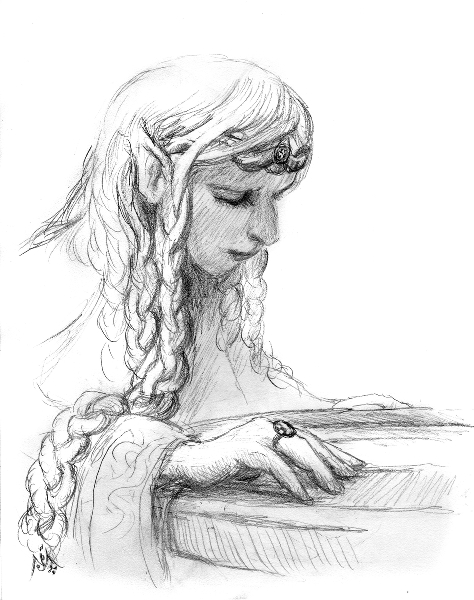CHAPTER 2
THE MIRROR OF MAN
Apart from Tolkien’s confession that The Lord of the Rings is “a fundamentally religious and Catholic work,” he also discussed what he called a “scale of significance” concerning the “relationship between personal facts and an author’s works.” In his own case, he discussed “insignificant,” “more significant,” and “really significant” facts relating to his role as the author of The Lord of the Rings. He placed at the very top of this scale the fact that he was “a Christian (which can be deduced from my stories), and in fact a Roman Catholic.”1 Concerning the specifically Catholic dimension, he cited with apparent approval a critic who had seen the invocations to Elbereth and the characterization of Galadriel as “clearly related to Catholic devotion to Mary.” He also referred to another critic who had seen lembas, the Elvish waybread, as signifying viaticum and the Eucharist. Commenting on the astuteness of these critics, Tolkien conceded that “far greater things may color the mind in dealing with the lesser things of a fairy-story.”2
In the same letter, immediately after the discussion of the paramount importance of his own Christianity in the “scale of significance,” Tolkien described himself as being a hobbit, thereby establishing an applicable link between the diminutive heroes in his epic and the world and people beyond the epic:
I am in fact a Hobbit (in all but size). I like gardens, trees and unmechanized farmlands; I smoke a pipe, and like good plain food (unrefrigerated) . . . I like, and even dare to wear in these dull days, ornamental waistcoats. I am fond of mushrooms (out of a field); have a very simple sense of humor (which even my appreciative critics find tiresome); I go to bed late and get up late (when possible). I do not travel much.3
In comparing himself to a hobbit, Tolkien is establishing the applicable connection between hobbits and humanity, indicating how his own fairy story, like all good fairy stories, holds up a mirror to man, showing us ourselves. It is, however, important to know what sort of man is being shown to us in The Lord of the Rings. It might be good, therefore, to ask ourselves the following key and fundamental question: Who is man?
For Tolkien, a deeply committed Christian, man is not simply homo sapiens, a label for humanity that was only invented in the early nineteenth century and has since become synonymous with what might be termed “Darwinian man”—man as simply a “naked ape,” the most intelligent of the primates. Countering such a view, Christianity sees man as a creature made in the image of God in a manner that distinguishes him radically from the rest of the animals. To reiterate Tolkien’s words, “[T]here is a part of man which is not ‘Nature’” and is, therefore, “wholly unsatisfied by it.”4 A better name for man is that given to him by the Greeks. The Greeks called man anthropos, which means “he who turns upward.” Unlike the other animals, which are governed by instinct and unable to do so, man looks up at the heavens, seeking a purpose and meaning beyond the mere creature comforts of everyday life. Reiterating Wilde’s epigram that we’re all in the gutter, but some of us are looking at the stars, we might see the gutter as the symbol of natural instinct and the stars as the symbol of supernatural desire. Man looks up; the lesser creatures do not. Man gazes; the animal grazes.
What we see reflected back to us in the magic mirror of Middle-earth is not homo sapiens, who is ultimately as enslaved by instinct as are the rest of the animals, but anthropos, who seeks his solace in the sun and the stars, the signifiers of the light of grace, echoing the words of Samwise Gamgee that “above all shadows rides the sun.”
Another understanding of man reflected back to us from Middle-earth is homo viator, the traveling man, the man on the journey of life, the man whose purpose is to get home by taking the adventure life throws at him. The archetypal homo viator in Western culture is perhaps Odysseus, but in Christian terms, the archetype is the medieval Everyman, who gets to heaven through his good works and the help of the Christian sacraments. For the Christian, every man is homo viator, whose sole purpose (and soul’s purpose) is to travel through the adventure of life with the goal of getting to heaven, his ultimate and only true home, facing many perils and temptations along the way.
The enemy of homo viator is homo superbus (proud man), who refuses the self-sacrifice that the adventure of life demands and seeks to build a home for himself within his “self.” Such a man becomes addicted to the sins that bind him, shriveling and shrinking to the pathetic size of his gollumized self. The drama of life revolves around this battle within each of us, between the homo viator we are called to be, and the homo superbus we are tempted to become. This drama is mirrored in Middle-earth in the struggles between selflessness and selfishness within the hearts of hobbits and men.
